
Giving birth to her first child at home without medication was a foregone conclusion for Margaret Nichols. Pain would yield to will, and that would be that. Throughout her pregnancy, the 40-year-old New York City meditation teacher pored over the natural-birth canon, books like Ina May Gaskin’s Spiritual Midwifery and Bountiful, Beautiful, Blissful by Gurmukh Kaur Khalsa. She became active in an international Facebook group dedicated to home and water births, stockpiling mindfulness tips to help her override the physical agonies of labor. She rented an inflatable blue birthing tub made of phthalate-free vinyl. Practically all her friends had given birth at home, and they assured her that the 118 gallons of water, warmed to roughly her body temperature, would function as “nature’s epidural.”
When Nichols went into labor last November, she felt elated, primed and cozy. She was surrounded by a midwife, a doula and her partner Jeff Hubbard. But 30 hours later she was in pain beyond imagination, howling what she later called desperate “animal-kingdom noises” as she hurtled in her midwife’s car toward a local hospital. There, she eagerly accepted anesthesia, took a brief nap and gave birth to a healthy son she named Bo.
Back home, Nichols commenced the course of exclusive breastfeeding that is prescribed to pretty much every new mother in America. She had hoped to nurse for two years. But after 5 months she developed lactation issues, which were exacerbated by a previously undiagnosed thyroid problem. She would have to supplement with donor milk and formula. Feeling like she hadn’t “succeeded” and that her story wasn’t “worthy,” she went dark on Facebook.
The beginning of motherhood for Nichols was thus tainted by disappointment. Seven months later, she describes a kind of “mourning” that her biology wouldn’t submit to her ideals. “I prepared so much for the birth, but the one thing that’s not talked about as much is how much support we need, and how vulnerable we are afterward,” she says.
You could argue that Nichols set herself up, that nobody should expect babies or bodies to adhere to best-laid plans. But like millions of other American moms, she had been bombarded by a powerful message: that she is built to build a human, that she will feel all the more empowered for doing so as nature supposedly intended and that the baby’s future depends on it. Call it the Goddess Myth, spun with a little help from basically everyone–doctors, activists, other moms. It tells us that breast is best; that if there is a choice between a vaginal birth and major surgery, you should want to push; that your body is a temple and what you put in it should be holy; that sending your baby to the hospital nursery for a few hours after giving birth is a dereliction of duty. Oh, and that you will feel–and look–radiant.

The myth impacts all moms. Because they partly reflect our ideals, hospital and public-health policy are wrapped up with it. But even the best intentions can cause harm. The consequences vary in degree, from pervasive feelings of guilt to the rare and unbearable tragedy of a mother so intent on breastfeeding that she accidentally starves her infant to death.
A survey of 913 mothers commissioned by TIME and conducted by SurveyMonkey Audience found that half of all new mothers had experienced regret, shame, guilt or anger, mostly due to unexpected complications and lack of support. More than 70% felt pressured to do things a certain way. More than half said a natural birth was extremely or very important, yet 43% wound up needing drugs or an epidural, and 22% had unplanned C-sections. Breastfeeding, too, proved a greater challenge than anticipated. Out of the 20% who planned to breastfeed for at least a year, fewer than half actually did. The majority of mothers in the survey, as well as those I talked to in dozens of additional interviews, pointed to “society in general” as the source of the pressure, followed by doctors and other mothers.
Help your kids thrive with the latest research-backed tips from TIME’s guide to parenting.
Partly to blame are tsk-tsking furies: the barista who challenges your coffee order, the mother-in-law who asks why the ketchup isn’t organic, the fellow partygoer who wonders, eyebrow cocked, if the drink you are holding is “virgin.” “Anytime I pulled out a bottle and powdered formula, I felt eyes staring at me with daggers,” says Ashley Sobel, a mom in New York. “Pumping instead of breastfeeding. Child going crazy on a plane. Going back to work immediately,” says Janel Molton, who lives in Palo Alto, Calif. “We live in a world where people fling judgments with their fingertips.”
This kind of mom-shaming, in which people feel licensed or even morally obligated to single out certain behaviors as wrong, might explain why many mothers I spoke to talked about their introductions to motherhood in the language of failure. A woman who had to be induced for a vaginal birth called her plans “not successful.” A mom who had planned to go medication-free but ultimately “gave in” to an epidural said she wished she had “trusted” her body. And while only one mother I talked to had an elective C-section, the ones who had unplanned surgeries were almost uniformly disappointed. The feelings were similar and even more widespread among moms who either couldn’t breastfeed or stopped for “selfish” reasons–bleeding nipples, lack of sleep, returning to work. Of course what these moms wanted–what we all know they wanted–was a healthy baby. That’s what most of them got. But what’s lost in the cacophony of anxiety is the other thing every mom wants: to enjoy the beauty of motherhood.

How did we come to believe that mothers should be compliant with nature–the master of evolutionary hardball–and then feel responsible when it works against us? Certainly, some of it is the Internet, which increasingly delivers medical information with a side of personal opinion.
Google the basics and the top results will frequently lead to BabyCenter.com, part medical resource, part Reddit for parents. The site, owned by Johnson & Johnson, features articles written by a medical advisory board, but what more often turns up are links to its community forums, where the expert opinion is that of your fellow mother. Take the question “Should I breastfeed or bottle-feed?” Search sends you to a BabyCenter chat on which the top-rated answer–a ranking of “helpfulness” determined by users’ likes–states: “For every 87 formula-fed babies who die of SIDS, only 3 breastfed babies die from SIDS.” This is false. On the site’s forums, you can find page after page of repeat visitors trash-talking and trolling one another. They call themselves “drama llamas.” This is what passes for expertise on one of the web’s most popular destinations for expectant and new mothers.
Elsewhere online, the goddess templates abound. There’s Genevieve Howland, a.k.a. Mama Natural, whose YouTube series has more than 64 million views. Nearly 19 million people have watched the videos she posted of her two natural births. There was Beyoncé’s pregnancy announcement on Instagram, showing the singer, then expecting twins, resplendent as a fecund deity. There are the legions of sublimely filtered public motherhoods, blogged in detail by women like Naomi Davis and Courtney Adamo.
It’s a lot to live up to, even for them. And yet it seems only natural to revere the vision of the effortlessly fertile, happily pregnant DIY mama who finds affirmation in the excruciating. Who doesn’t want to believe that motherhood is innate? I certainly did. When I was pregnant with my daughter, I Googled everything. I grilled my OB on skipping pain meds (she laughed) and pondered the benefits of a doula (she scoffed). I wound up having a C-section when my daughter didn’t descend. And, yes, I was sad about it. My daughter couldn’t nurse, so I pumped for almost five months, stashing away freezer bags with the zeal of a doomsday prepper to carry her to 6 months exclusively on breast milk. I felt smug about my supply, and guilty when I eventually stopped.
I asked Dr. Mary Jane Minkin, a clinical professor of obstetrics at Yale School of Medicine, if my feelings were common. She said she sees women making themselves “crazy” over the wish to do things as naturally as possible, including giving birth intervention-free and breastfeeding. “In the 1900s, we didn’t have a lot of interventions,” she tells me. “Guess what? People died. The average female life expectancy was 48. That was as ‘natural’ as it got.” Catherine Monk, a psychologist and associate professor at Columbia University Medical Center, whose research focuses on maternal stress, echoes Minkin. “There’s a crescendo of voices saying, ‘If you don’t do X or Y, you’re doing it wrong,'” Monk says. The result is “a kind of over-preciousness about motherhood. It’s obsessive, and it’s amplified by the Internet and social media.”
Time was, women desperately needed someone like Ina May Gaskin. The Tennessee midwife has authored several popular natural-birth manuals, starting with Spiritual Midwifery in 1975–not long after a time when husbands were often banned from delivery rooms, women were put under general anesthesia during labor and formula-feeding was the rule rather than the exception. The book detailed the methods of a freethinking commune called the Farm where Gaskin and other midwives delivered babies. (Women still give birth there.) Even for moms who didn’t want to give birth in a cabin in the woods, Gaskin and those who followed her helped foster a culture in which women felt empowered to make their own obstetrical choices.
Gaskin’s work also helped popularize the role of midwives in the U.S. Midwives, in turn, have precipitated the rise of the doula, or birth assistant, over the past few decades. In 2015, more than 38,000 births took place at home. Most of them were planned and part of a big increase in out-of-hospital births over the past decade, which now account for more than 1.5% of all U.S. births–almost as many as elective C-sections. Overall, C-sections are down for the third year in a row, making up 26% of low-risk first births.
Philosophies about having a baby the “right way”—and the scientific knowledge undergirding the advice we’re expected to follow—are, like so much else in health trends, cyclical. To epidural or not to epidural? It will give you a wicked headache (highly possible, says science), or it will hamper your bonding with the baby (somewhat possible, says other science), or it may not work at all (there’s always that chance). It wasn’t long ago that formula was promoted as a bounty of women’s lib. Today it’s disparaged as a last resort.
These pendulum swings make motherhood harder and more confusing, something I heard a lot about from the moms I spoke with for this article. “With my first, I found myself really stressed out trying to live up to it all and embarrassed when I couldn’t,” says Seana Norvell, a California mom who had a C-section when her first baby was breech. She had trouble producing enough milk, but she obsessed about breastfeeding. Her husband and mother secretly fed her child formula, an act she says she is now grateful for. “As a new mom, it’s easy to feel judged,” says Tennessee mother Kaitlyn Kambestad. “There are so many conflicting studies, ideas and opinions. It’s overwhelming.”

The one thing being pitched universally these days is breastfeeding. There are good reasons to do it: it may help reduce gastrointestinal infections, middle-ear infections and some immune-based diseases like allergies and asthma. It’s free. It could be lovely bonding time with your baby. All of which is why more than 80% of American moms try it. Dr. Lori Feldman-Winter, a representative of the American Academy of Pediatrics, says evidence supports the belief that mother’s milk impacts babies’ brain activity. “It’s particularly apparent in premature babies,” she says. “Probably it’s most important in the most vulnerable populations.”
But where women used to claim that formula was excessively pushed on them, the preaching, both from many doctors and from fellow mothers, may now have gone too far the other way. Take the Baby-Friendly Hospital Initiative (BFHI). Established in 1991 by the World Health Organization and UNICEF, the BFHI is an effort to help women around the world breastfeed exclusively from day one until a baby is 6 months old and for as long as possible once solid foods are introduced. It was meant to ensure proper nutrition, especially in regions that lack clean drinking water. But it has also been influential in the U.S. because it designates hospitals that conform to its rules as “baby-friendly.” Last year, almost 20% of America’s 3.9 million newborns were delivered in one of 420 BFHI-certified facilities. There’s at least one in every state.
If you walk into a BFHI-certified hospital, the signs will be clear: there are images everywhere of mothers nursing their babies. You won’t see any formula, bottles or pacifiers on display. Those are forbidden under BFHI guidelines, which state that human milk is “the normal way” to feed an infant. If a mother wants to formula-feed, this hospital must warn of “possible consequences” to the baby’s health. The BFHI also strongly recommends rooming-in, the practice of having babies sleep in the hospital room, if not in the bed, with their mom.
The pressure to room-in alarms some doctors. Last October, after several of Boston’s largest hospitals shut down newborn nurseries to achieve the BFHI designation, three prominent physicians wrote a scathing viewpoint in JAMA Pediatrics, a leading peer-reviewed journal. “There is now emerging evidence that full compliance with the 10 steps of the initiative may inadvertently be promoting potentially hazardous practices and/or having counterproductive outcomes,” wrote Dr. Joel L. Bass and Dr. Tina Gartley, both in pediatrics at Newton-Wellesley, and Dr. Ronald Kleinman, the physician-in-chief at MassGeneral Hospital for Children. They worry that rooming-in could lead to mothers’ accidentally smothering their children and possibly contribute to sudden unexpected postnatal collapse, a rare but often fatal respiratory failure.
When I ask Trish MacEnroe, the executive director of the BFHI’s U.S. arm, what the possible consequences of not breastfeeding are–Injury? Illness? Death?–she tells me: “Breast milk and formula are not equivalent to one another. The mother’s breast milk is a unique biological food.” The goal of the BFHI, MacEnroe says, “is not to produce guilt, but it is to prevent regret. We believe mothers have the right to know about the impact of their decisions.”
Even if they don’t give birth in a BFHI-certified hospital, the refrain that new moms hear may not be so different. In April, the American Academy of Pediatrics issued a stern statement underscoring that “breastfeeding should be considered a public-health imperative and not merely a lifestyle choice.” But it’s hard to wrap your head around what “lifestyle choice” means when, say, you are suffering the pain of plugged ducts, or staying up all night for cluster feedings, or trying to please zealous lactation consultants. Not to mention the likelihood that you’re among the 87% of American workers who don’t have paid maternity leave. Given any–or all–of those factors, you could be forgiven for feeling like you’re set up to fail. As Rachel Zaslow, a certified nurse-midwife in Charlottesville, Va., puts it, “The minute a person becomes pregnant, there’s a notion that if you’re not doing those kinds of things, you’re not a good mother.”
Luckily, An anti-shame canon is growing. Political scientist Courtney Jung’s recent book Lactivism argues that breast milk has become an industry the way formula once was, compounding the incentives and pressures that potentially hurt moms. Dr. Amy Tuteur, a former OB, wrote Push Back, a polemic against natural parenting. In Blaming Mothers, legal scholar Linda Fentiman writes that “mothers—and pregnant women—are increasingly seen as exclusively responsible for all aspects of their children’s health and well-being.” In the spring, Dr. Alexandra Sacks wrote about the difficult process of matrescence—the total identity shift of becoming a mother—for the New York Times. All strains of the goddess myth.
There is a backlash beyond the bookshelf too. Last year, Dr. Christie Del Castillo-Hegyi, an emergency-room physician in Arkansas, founded Fed Is Best. The organization, run by a group of doctors, nurses and mothers, raises awareness of feeding options. It wants the BFHI to reconsider its stringent rules and to inform mothers on what Del Castillo-Hegyi says are under-recognized risks of exclusive breastfeeding, ranging from jaundice to starvation. She would know. Several years ago, in her quest to exclusively breastfeed, she nearly starved her infant son to death. Some of the mothers who work with Fed Is Best have had similar experiences, in a few cases leading to their babies’ death. They are determined to keep such tragedy from striking others. “If you have leaders telling you this is what’s best, it becomes ideology, policy, identity,” says Del Castillo-Hegyi. “I can’t even think of something more vulnerable than motherhood. And if motherhood means ‘exclusive breastfeeding,’ then a mother will do anything.”
Mothers will do anything. I knew that going into my research for this story. But for all the communal aspects of bearing and raising children, for all the prescriptions we follow on the path of shaping another human, motherhood is a uniquely individual experience. Even amid harsh self-reflection, the moms I spoke to who had been let down ultimately concluded as much. “After the birth, I saw how judgmental I was about parenting styles,” New York City mom Margaret Nichols says. “I realized we all have our path and way of thinking, and what works for each mother is exactly perfect for that child.” Says Seana Norvell, who recently gave birth to her third child: “What I’ve learned is there are some things you can control, but there is a lot you can’t. We just have to give ourselves a break and do the best we can.”
It’s hard to keep an individual “best” in mind amid images of glory and perfection, and anecdotal stories about what worked or didn’t for another mom. But “women are coming out and talking more about [the problems of motherhood],” says Domino Kirke, a New York doula with a practice in Los Angeles, whose popular Instagram account is filled with graphic but exhilarating images of the births she attends: mothers and their newborns amid bloody placenta on the bed at home as well as gracefully shot operating rooms where C-sections give way to joy. She says she wants to help mothers erase “the unknown,” which is where she thinks the shame and guilt come from.
Among the 112,693 photographs that are hashtagged #nationalbreastfeedingweek and #worldbreastfeedingweek, there are a few rogue bottles, some defiant pumps and the red, tear-streaked face of a mother named Angela Burzo. Her nursing selfie, captioned “This photo depicts my reality,” went viral in August, no doubt thanks to its truth-to-myth frankness. Even among the picture-perfect mommy bloggers, some are making a concerted effort to talk about the dissonance between what we see and what we feel. LaTonya Yvette, a popular lifestyle blogger who offers refreshing assessments of “honest motherhood,” is just one of them. Says Yvette: “The story I share as mother directly aligns with the mother I am.”
Motherhood in the connected era doesn’t have to be dominated by any myth. Social media can just as easily help celebrate our individual experience and create community through contrast. Moms have to stick together even as we walk our separate paths. We have to spot the templates and realize there are no templates. We have to talk about our failures and realize there are no failures.
—With reporting by ALICE PARK and ALEXANDRA SIFFERLIN/NEW YORK
More Must-Reads From TIME
- The 100 Most Influential People of 2024
- Coco Gauff Is Playing for Herself Now
- Scenes From Pro-Palestinian Encampments Across U.S. Universities
- 6 Compliments That Land Every Time
- If You're Dating Right Now , You're Brave: Column
- The AI That Could Heal a Divided Internet
- Fallout Is a Brilliant Model for the Future of Video Game Adaptations
- Want Weekly Recs on What to Watch, Read, and More? Sign Up for Worth Your Time
Contact us at letters@time.com